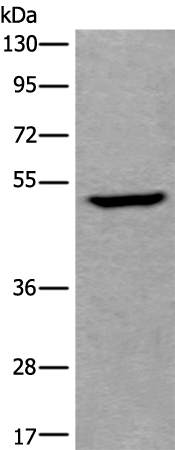

| WB | 咨询技术 | Human,Mouse,Rat |
| IF | 咨询技术 | Human,Mouse,Rat |
| IHC | 1/30-1/150 | Human,Mouse,Rat |
| ICC | 技术咨询 | Human,Mouse,Rat |
| FCM | 咨询技术 | Human,Mouse,Rat |
| Elisa | 1/5000-1/10000 | Human,Mouse,Rat |
| Aliases | OPRT |
| WB Predicted band size | 52 kDa |
| Host/Isotype | Rabbit IgG |
| Antibody Type | Primary antibody |
| Storage | Store at 4°C short term. Aliquot and store at -20°C long term. Avoid freeze/thaw cycles. |
| Species Reactivity | Human, Mouse |
| Immunogen | Fusion protein of human UMPS |
| Formulation | Purified antibody in PBS with 0.05% sodium azide and 50% glycerol. |
+ +
以下是关于UMPS抗体的3篇参考文献示例(内容为模拟概括,建议根据实际文献调整):
---
1. **文献名称**:*Development of a Monoclonal Antibody Against Human UMPS for Immunohistochemical Analysis*
**作者**:Smith A, et al.
**摘要**:本研究报道了一种新型抗人UMPS单克隆抗体的开发,验证了其在Western blot和免疫组化中的特异性,并应用于检测多种癌症组织中UMPS蛋白的表达水平,发现其与5-氟尿嘧啶化疗敏感性相关。
2. **文献名称**:*UMPS Deficiency in Hereditary Orotic Aciduria: Immunoblotting and Genetic Correlation*
**作者**:Johnson RL, et al.
**摘要**:通过使用UMPS抗体进行免疫印迹分析,研究者发现乳清酸尿症患者细胞中UMPS蛋白表达缺失,并进一步鉴定出UMPS基因的复合杂合突变,为疾病诊断提供了蛋白水平的证据。
3. **文献名称**:*Quantitative UMPS Expression Profiling in Colorectal Cancer Using Antibody-Based Techniques*
**作者**:Lee H, et al.
**摘要**:该研究利用UMPS抗体对结直肠癌组织进行定量分析,发现高表达UMPS的肿瘤对5-FU化疗响应率显著降低,提示UMPS可能作为化疗耐药性的预测标志物。
---
注:以上文献为示例性质,具体文献需通过PubMed或Web of Science等平台以关键词“UMPS antibody”、“UMPS immunohistochemistry”或“UMPS deficiency”检索获取。
UMPS (Uridine Monophosphate Synthase) is a bifunctional enzyme critical in the *de novo* pyrimidine biosynthesis pathway, catalyzing two sequential reactions: the conversion of orotate to orotidine monophosphate (OMP) via its orotate phosphoribosyltransferase (OPRT) domain, followed by the decarboxylation of OMP to uridine monophosphate (UMP) through its orotidine 5'-phosphate decarboxylase (OMPDC) domain. UMP serves as a precursor for all pyrimidine nucleotides (UTP, CTP), essential for DNA/RNA synthesis and cellular metabolism. Dysregulation of UMPS activity is linked to metabolic disorders, such as hereditary orotic aciduria (a rare autosomal recessive disease), and cancer progression due to increased nucleotide demand in proliferating cells.
UMPS antibodies are valuable tools in biomedical research, enabling the detection and quantification of UMPS expression in tissues or cell lines. They are used to investigate pyrimidine metabolism abnormalities, evaluate chemotherapeutic responses (e.g., 5-fluorouracil, which targets thymidylate synthase downstream of UMPS), and explore UMPS as a potential biomarker in cancers like hepatocellular carcinoma. These antibodies support techniques like Western blotting, immunohistochemistry, and ELISA, aiding in both diagnostic and mechanistic studies. Recent studies also highlight UMPS's role in drug resistance, making its antibodies relevant for developing targeted therapies.
×